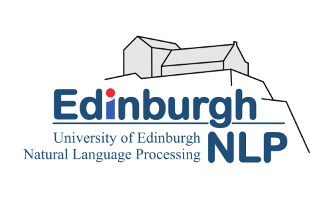Accessibility Statement for EdinburghNLP
This accessibility statement applies to EdinburghNLP website. This website is run by the School of Informatics at the University of Edinburgh and is on the edinburghnlp.inf.ed.ac.uk domain.
We want as many people as possible to be able to use this website. For example, that means you should be able to:
- zoom in up to 200% without the text spilling off the screen
- navigate most of the website using just a keyboard
- navigate most of the website using speech recognition software
- listen to most of the website using a screen reader (including the most recent versions of JAWS, NVDA and VoiceOver)
We’ve also made the website text as simple as possible to understand.
Customising the website
AbilityNet has advice on making your device easier to use if you have a disability.
AbilityNet has advice on making your device easier to use if you have a disability. This is an external site with suggestions to make your computer more accessible.
AbilityNet – My computer my way
If you are a member of University staff or a student, you can use the free SensusAccess accessible document conversion service:
Information on accessible document conversion service – SensusAccess
How accessible this website is
We know some parts of this website are not fully accessible:
- the text will not reflow in a single column when you change the size of the browser window
- you cannot modify the line height or spacing of text
- you cannot skip to the main content when using a screen reader
Feedback and contact information
If you need information on this website in a different format like accessible PDF, large print, easy read, audio recording or braille:
scohen@inf.ed.ac.uk
0131-650-6542
We’ll consider your request and get back to you as soon as possible.
Reporting accessibility problems with this website
We’re always looking to improve the accessibility of this website. If you find any problems not listed on this page or think we’re not meeting accessibility requirements, contact: scohen@inf.ed.ac.uk.
Enforcement procedure
The Equality and Human Rights Commission (EHRC) is responsible for enforcing the Public Sector Bodies (Websites and Mobile Applications) (No. 2) Accessibility Regulations 2018 (the ‘accessibility regulations’). If you’re not happy with how we respond to your complaint, contact the Equality Advisory and Support Service (EASS).
Contact details for the Equality Advisory and Support Service (EASS)
The government has produced information on how to report accessibility issues:
Reporting an accessibility problem on a public sector website
Technical information about this website’s accessibility
The School of Informatics is committed to making its website accessible, in accordance with the Public Sector Bodies (Websites and Mobile Applications) (No. 2) Accessibility Regulations 2018.
Compliance status
This website is partially compliant with the Web Content Accessibility Guidelines version 2.1 AA standard, due to the non-compliances listed below.
Non-compliance with the accessibility regulations
Noncompliance with the accessibility regulations
The following items do not comply with the WCAG 2.1 AA success criteria
- It is not possible to use a keyboard to access all the content
Disproportionate burden
We are not currently claiming that any accessibility problems would be a disproportionate burden to fix.
What we’re doing to improve accessibility
A regular quarterly central website audit using an automated service, followed by manual prioritisation of issues with key user journeys
Preparation of this accessibility statement
This statement was prepared on 16 September 2020. It was last reviewed on 22 September 2020.
This website was last tested on 16 September 2020. The test was carried out by the School of Informatics at the University of Edinburgh.
We manually test all the pages of the website.
While the website was last tested in September 2020 there is also a quarterly auditing process. Tests are carried out using WebAIM WAVE Web Accessibility Evaluation Tool. The testing is followed by manual prioritisation of any issues with key user journeys.

